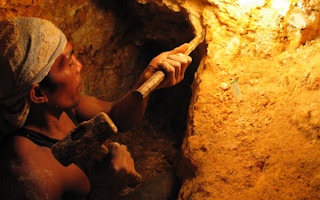As the Philippines works to ramp up mining to meet global demand for metals crucial to the green energy transition, environmental groups are demanding strict limits to protect nature and Indigenous lands.
The Philippines has the world’s fourth-largest copper reserves, fifth-biggest nickel deposits and is also rich in cobalt - all of which have important uses in clean energy technologies, from lithium-ion batteries for electric vehicles (EVs) to solar panels.
Mineral requirements for renewable energy technologies must be quadrupled by 2040 to reach the goals of the Paris Agreement, and the World Bank estimates a 500 per cent increase in the demand for transition minerals.
That is encouraging mineral-rich countries like the Philippines, where mining is relatively undeveloped and only accounts for 1 per cent of gross domestic product (GDP), to boost their production of so-called critical minerals.
But with nearly two-thirds of the Philippines’ mineral reserves lying on Indigenous lands, environmental and rights campaigners are demanding new legislation to limit mining activity to the minimum needed for the green energy switch.
“Mining is a necessary evil in our civilisation and daily life. But we believe in mining anchored on just minerals transition, or mining what is absolutely necessary and sourcing them responsibly,” said Maya Quirino, advocacy coordinator at the Legal Rights and Natural Resources Centre (LRC), a local nonprofit that works for Indigenous and environmental rights.
“For example, gold is not essential to the energy transition,” she told Context.
Quirino’s organisation is leading calls for a new mining law that would only permit the “indispensable extraction” of critical minerals. It also seeks to prohibit destructive open-pit mining, or mining in sensitive ecosytems, and hike taxes on the companies to give great benefits to local communities.
A draft bill filed by lawmakers and supported by the LRC in 2021 is still pending in Congress, but its backers are working to gain more support this year from legislators.
“
Mining is a necessary evil in our civilisation and daily life. But we believe in mining anchored on just minerals transition, or mining what is absolutely necessary and sourcing them responsibly.
Maya Quirino, advocacy coordinator, Legal Rights and Natural Resources Centre
Just transition?
Globally, the area covered by mines has doubled over the past three years, driven by demand for critical minerals, according to a 2023 study by LRC.
In the Philippines, the group says, that has exacerbated mining’s negative impacts on people and the environment - whether by depleting water supplies or forcing Indigenous peoples to move elsewhere.










